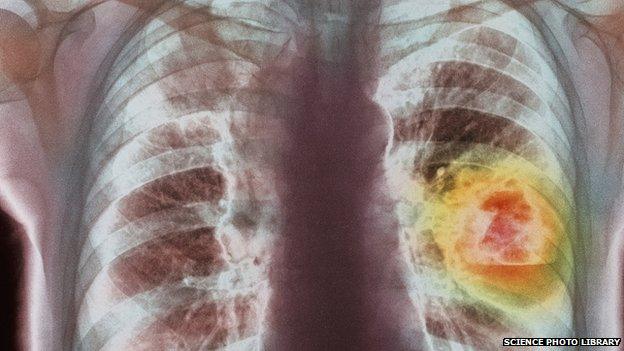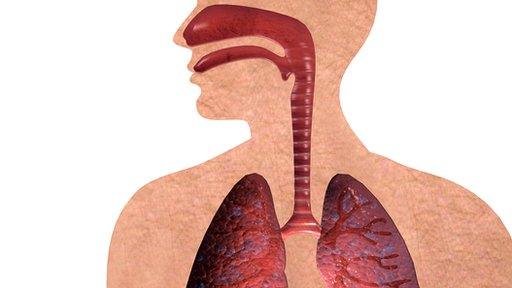GPs in UK 'missing opportunities' to spot lung cancer
- Published

Lung cancer kills more than 35,000 people a year and is the biggest cause of cancer death in the UK
Doctors in Britain are "missing opportunities" to spot lung cancer at an early stage, meaning one in three people with the disease dies within 90 days of diagnosis, research suggests.
A study of lung cancer cases in 20,142 people aged over 30 found one in 10 had died within a month of diagnosis.
One in 20 had been diagnosed only after they had died, the study, published in the British Medical Journal, says.
Researchers said GPs needed better diagnostic tools, such as software.
Lung cancer kills more than 35,000 people a year and is the biggest cause of cancer death in the UK.
Britain falling behind
Scientists based at the University of Nottingham tried to find the reason why fewer people in the UK with lung cancer survive than in other countries.
In Sweden, for example, 46% of people with the disease between 2004 and 2007 survived a year, compared with 30% in Britain, external.
The odds of an early death rose with the number of GP consultations a patient attended, they found.
Those who had died had visited their GP an average of five times in the months before diagnosis, the study said, external.
Even surgeries that carried out lots of chest X-rays did not "appear to translate" to a reduction in early deaths from lung cancer, it said.
Lead scientist Dr Emma O'Dowd said the findings contrasted with her expectations that people with lung cancer were not visiting the doctor, accounting for Britain's lower survival rates.
The study said out of the 20,142 people:
1,071 had been diagnosed at death
2,036 had died within 30 days of diagnosis
2,976 had died between 31 and 90 days after diagnosis
'Face-to-face' benefit
Dr O'Dowd said: "If patients are coming into the surgery and having a face-to-face interaction with a doctor, at least there is an opportunity to treat them."
She said if people had not been visiting the doctor "at all", it would have been more a public-engagement issue, which could be hard to manage.
"At least there is something we can do," she said.

Other patterns in people dying an early death, defined as within three months of diagnosis, were highlighted by the study.
Men were more likely to die of lung cancer than women - 57%, or 11,468, of those who died were men. Of these, 3,585 died within 90 days of diagnosis compared with 2,498 of the women.
'In-depth' study
Dr O'Dowd said the fact more men than women smoked cigarettes in the past could be partly behind the gender gap.
And people in rural areas were more likely than those in urban areas to die an early death from lung cancer, said the paper.
Researchers called for software allowing doctors to type in symptoms of lung cancer to rapidly identify the fatal disease, which is the most difficult to diagnose as symptoms can look like other conditions, such as chest infections.
John Field, at the University of Liverpool, said the study was "one of the most in-depth primary care studies undertaken to date" on lung cancer.
He said: "The paper supports the argument that we do need to do a great deal more for potential lung cancer patients than what is provided at present."
Data due from trials in the next two years would help decide the best, cost-effective treatments, he said.
Dr Penny Woods, the chief executive of the British Lung Foundation, said: "The finding that one in three UK lung cancer patients dies within three months of diagnosis is sadly a very telling consequence of late presentation and delayed diagnosis.
"These are major reasons why lung cancer continues to be the biggest cancer killer in the UK, and why survival rates in this country lag behind those throughout Europe and the US.
"Evidence suggests that well-funded awareness campaigns are proving very successful in increasing earlier diagnosis. A continuation and expansion of such campaigns will be crucial if we are to significantly improve lung cancer survival."
- Published11 September 2014

- Published6 September 2013

- Published30 October 2013
